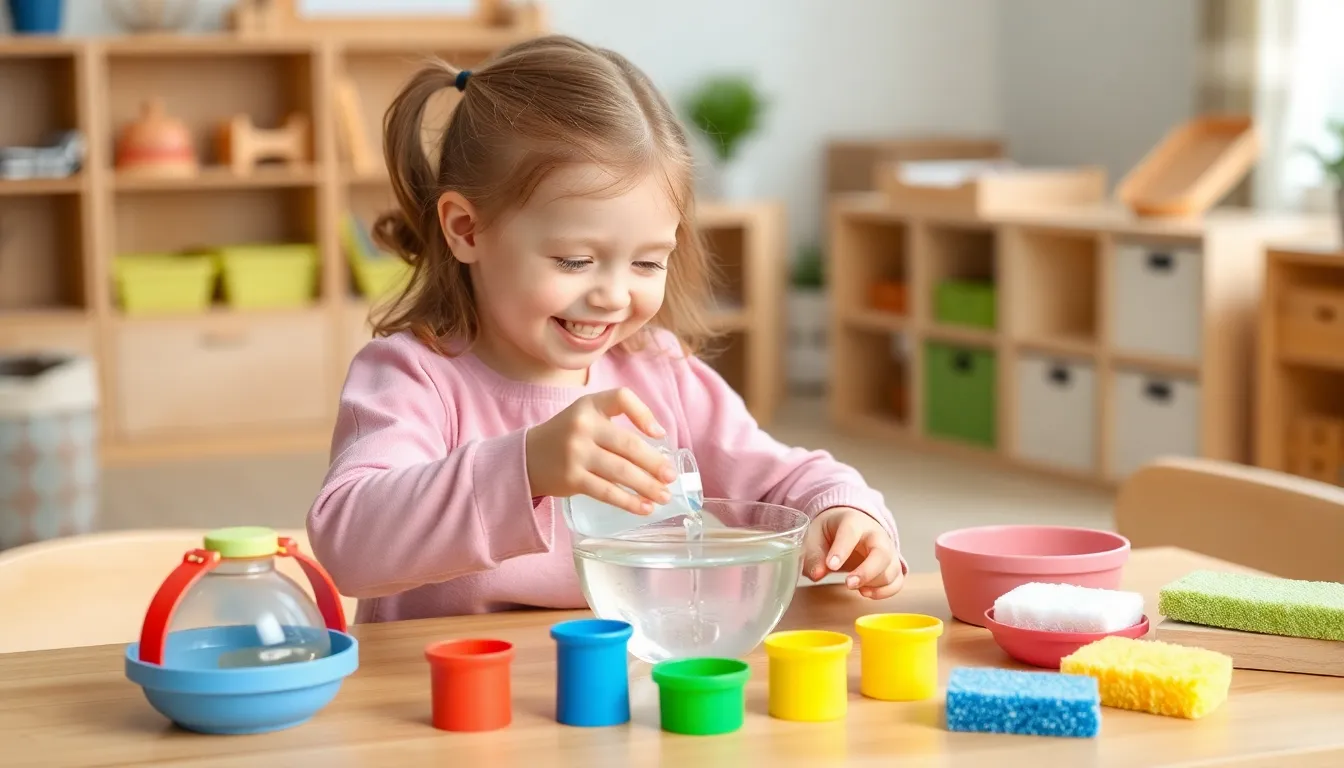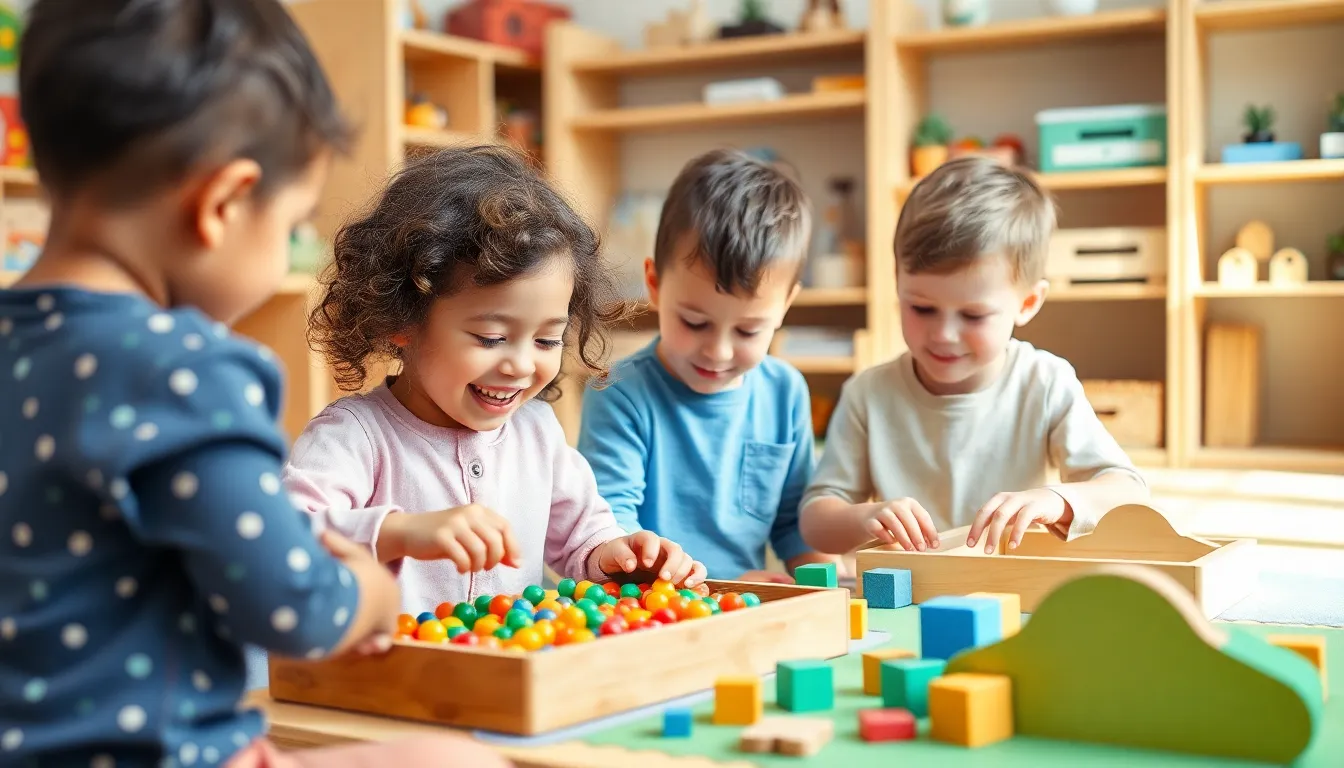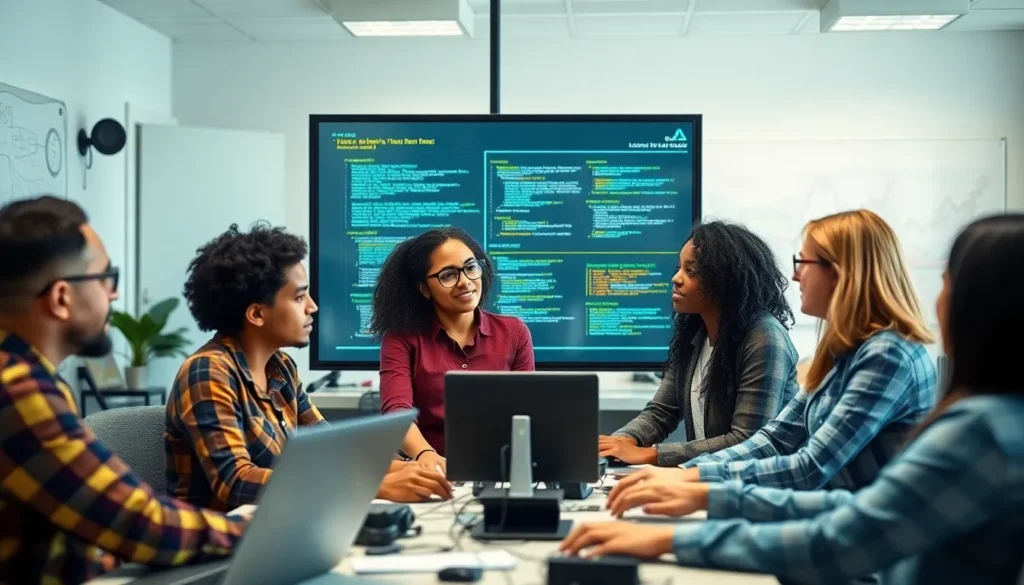Table of Contents
ToggleIn the colorful world of preschool education, Montessori materials stand out like a unicorn in a field of horses. Designed to spark curiosity and promote independent learning, these tools transform the classroom into a playground of discovery. Imagine your little one mastering math with counting beads instead of dreary worksheets—now that’s a win-win!
Montessori materials aren’t just toys; they’re carefully crafted instruments that encourage hands-on learning and critical thinking. From sensory bins to stacking toys, each item is tailored to engage young minds while keeping boredom at bay. So, if you want to unlock your child’s potential and watch them thrive, dive into the magical realm of Montessori materials. After all, who knew education could be this much fun?
Overview of Montessori Materials for Preschoolers
Montessori materials for preschoolers offer a unique approach to early education, emphasizing experiential learning. These materials, designed to engage young minds, foster critical skills in children. Learning resources include items such as counting beads, sensory bins, and tactile shapes, all promoting hands-on exploration.
Purposeful design characterizes each material, enabling children to grasp complex concepts through play. Counting beads, for instance, enhance numerical understanding and fine motor skills simultaneously. Sensory bins provide opportunities for sensory exploration, supporting cognitive development and problem-solving skills.
Educational progress occurs at each child’s individual pace, thanks to the hands-on nature of these materials. Autonomous choice empowers preschoolers to select activities that pique their interest, cultivating independence and self-motivation. This approach aligns with the Montessori philosophy, which prioritizes autonomy in learning.
Social interaction becomes another vital aspect of Montessori materials, as children often work collaboratively. Practical life activities, such as pouring water or sorting objects, promote collaboration and communication among peers while building essential social skills.
Diverse materials facilitate holistic development across multiple domains, including cognitive, physical, and social-emotional growth. Visual supports, like color-coded materials, aid children in organizing thoughts and concepts, improving their understanding.
Montessori materials serve as more than mere toys; they unlock potential, making learning enjoyable and effective. By integrating these educational tools into classrooms, educators create stimulating environments conducive to deep learning experiences.
Types of Montessori Materials

Montessori materials support various aspects of preschool learning. Each type targets specific developmental needs and enhances engagement.
Practical Life Materials
Practical life materials cultivate essential life skills. Tools like pouring sets and sponges boost fine motor skills and coordination. Children practice everyday tasks, fostering independence. They learn to care for themselves and their environment. Through activities such as buttoning and sweeping, children enhance concentration and self-discipline. These materials create valuable opportunities for experiential learning, setting a foundation for personal responsibility.
Sensory Materials
Sensory materials engage children’s five senses. Tools like sensory bins and textured fabrics promote exploration and discovery. Children gain awareness of their environment while enhancing cognitive skills. Materials designed for manipulation, such as sound boxes, develop auditory discrimination. Different colors and shapes encourage visual perception. Such hands-on experiences enrich sensory development, fostering curiosity and critical thinking.
Language Materials
Language materials encourage communication and literacy skills. Tools like letter tiles and picture matching cards aid in vocabulary development. Children interact with sounds and symbols, enhancing phonetic awareness. Storytelling materials inspire creativity and comprehension. Engaging with these resources nurtures a love for reading from an early age. Language materials also promote social interaction through group activities, building essential conversational skills.
Mathematical Materials
Mathematical materials introduce foundational concepts through hands-on learning. Tools like counting beads and number rods develop numerical understanding. Children explore basic arithmetic using tangible objects. Activities involving geometric shapes enhance spatial awareness. Manipulatives like balance scales foster critical problem-solving skills. These engaging resources make mathematics enjoyable while supporting individual learning progress.
Benefits of Using Montessori Materials
Montessori materials offer numerous benefits that enhance early childhood education in preschool settings. They encourage hands-on experiences, fostering skills essential for personal growth and learning.
Enhancing Independence
Montessori materials promote independence by allowing children to choose their activities. They explore at their own pace, developing confidence in their abilities. Practical life materials, like pouring sets and sponges, give kids the chance to practice self-care and everyday tasks. Engaging with these tools enables children to learn responsibility while accomplishing specific objectives. The autonomy gained from interacting with Montessori materials nurtures decision-making capabilities, empowering young learners to take charge of their educational journey.
Promoting Cognitive Development
Cognitive development thrives through the use of Montessori materials in preschool. Materials, like counting beads and puzzles, encourage problem-solving and critical thinking. Sensory activities stimulate exploration and engagement, creating connections in young minds. Children actively interact with materials, enhancing memory and understanding of complex concepts. Each learning experience aligns with developmental milestones, promoting curiosity and a love for learning. This approach creates a strong foundation for future academic success through experiential play and exploration.
How to Choose Montessori Materials for Preschoolers
Selecting Montessori materials requires careful consideration of several factors. Understanding how these materials resonate with preschoolers enhances their learning experiences.
Age Appropriateness
Choosing age-appropriate materials is essential. Materials must align with the developmental stages of children aged three to six years. For example, simple puzzles cater to younger preschoolers, while more complex tasks like bead sequencing engage older children. Educators should evaluate the child’s motor skills and cognitive abilities. Age-appropriate materials promote confidence and mastery as children interact with them. Additionally, offering varied difficulty levels ensures that each child can find materials that challenge them without causing frustration.
Material Quality
Material quality significantly impacts educational experiences. Durable materials withstand rigorous use, ensuring longevity in a dynamic classroom environment. Opting for materials made from natural resources fosters a connection to the real world. For instance, wooden toys and fabric items enhance tactile experiences. High-quality materials often feature non-toxic finishes, keeping children safe during play. Furthermore, observing how well materials stimulate engagement and curiosity can guide selection. Ultimately, investing in quality leads to richer learning experiences, encouraging exploration and discovery.
Montessori materials offer a transformative approach to preschool education. These tools not only engage children’s curiosity but also promote independence and critical thinking. By fostering a love for learning through hands-on experiences, they lay a strong foundation for future academic success.
Choosing the right materials is essential for maximizing their benefits. Educators and parents alike can create enriching environments that support holistic development. With the right Montessori materials, preschoolers can thrive, exploring their world with confidence and joy.




